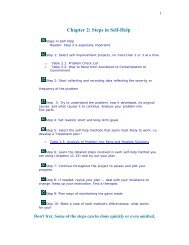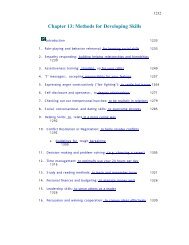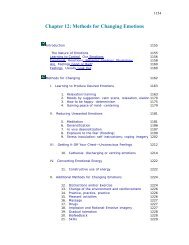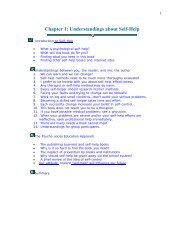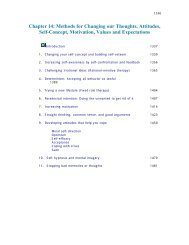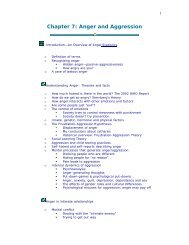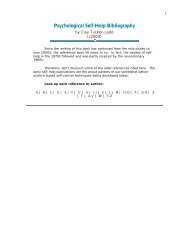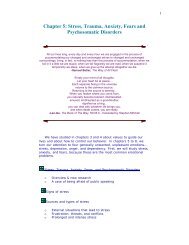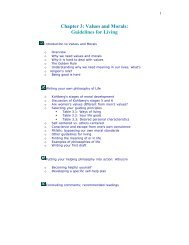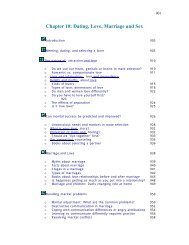Methods for Changing Behaviors - Psychological Self-Help
Methods for Changing Behaviors - Psychological Self-Help
Methods for Changing Behaviors - Psychological Self-Help
You also want an ePaper? Increase the reach of your titles
YUMPU automatically turns print PDFs into web optimized ePapers that Google loves.
eturns. Also, the self-punisher should place considerable emphasis on<br />
learning the desired behavior to replace the unwanted behavior.<br />
Time out, overcorrection, and response cost are effective in the<br />
short-term with handicapped patients, although in some cases<br />
symptom substitution occurs (other unwanted behavior increases).<br />
The long-term results of aversive techniques in humans are not known<br />
yet.<br />
There are some dangers, in addition to the physical risks and antiself-help<br />
attitudes mentioned above. Any potentially high emotion<br />
and/or self-demeaning method could cause harm, I suppose, but this<br />
has not been observed. Yet, self-critical persons urged to become even<br />
more self-critical could be harmed.<br />
Additional readings<br />
Bellack, A. and Hersen, M. Behavior modification, New York:<br />
Ox<strong>for</strong>d University Press, 1977.<br />
Matson, J. L. & DiLorenzo, T. M. (1992). Punishment and its<br />
alternatives. Springfield, IL: Springer.<br />
Covert conditioning; covert punishment; covert rewards; intrinsic<br />
satisfaction and pride<br />
Our thoughts control or influence our behaviors and emotions to a<br />
considerable extent. This is not surprising since our thoughts include<br />
intentions ("I'm going to be the top salesperson this month"), plans<br />
("I'll work until 9:00 every day and on weekends"), rational and<br />
irrational thinking, all our knowledge (including self-help methods),<br />
and so on. It seems pretty clear that our thoughts can be changed<br />
through experience (reading, watching, listening, experimenting),<br />
logical reasoning, learning processes (rewarding certain thoughts), and<br />
many other ways.<br />
Some psychologists believe we can also change the frequency or<br />
strength of specific thoughts by rein<strong>for</strong>cing or punishing the thought.<br />
In other words, the conditioning processes might work inside our<br />
heads with thoughts just like they work with behavior, except it is all<br />
covert. Actually, no one would be surprised if his/her urge to approach<br />
someone increased after having a lot of sexual fantasies about that<br />
person. That all takes place inside a person's head. Likewise, if you<br />
imagined studying math on a beautiful warm beach, fantasized<br />
winning a scholarship in math, and on and on, it is possible you would<br />
start to feel more positive about math. What is less clear and more<br />
complex is whether or not the person will actually approach the person<br />
they have been thinking about sexually or if you would actually take a<br />
math course. There is a giant leap from fantasy to reality.<br />
1146



